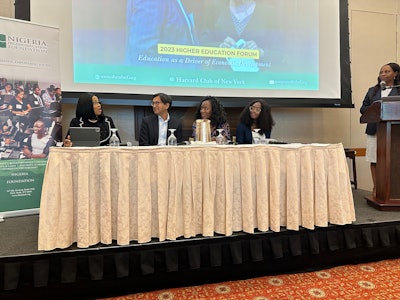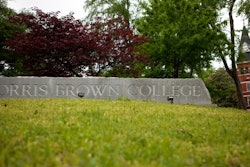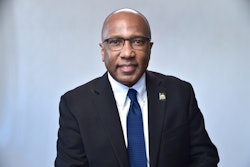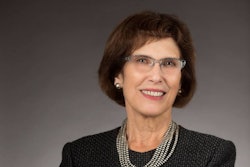There is little doubt that education will prove crucial to the economic development of Nigeria, a country where 63% of residents live with some form of deprivation. However, exactly what needs to be done for the educational system to reach its full potential is far less certain.
On Friday, professors, executives, and non-profit leaders gathered at the Harvard Club of New York for a series of discussions on how education can help Nigeria achieve its economic goals.
The discussions made up the bulk of the 2023 Nigeria Higher Education Forum, a morning-long event put on by the Nigeria Higher Education Forum (NHEF). The NHEF, founded by the John D. and Catherine T. Macarthur Foundation in 2004, focuses on developing the capacity of higher education institutions in the West African nation. The panels revealed clear goals.  Panelists at the 2023 Nigeria Higher Education Forum. Left to right: Dr. Femi Pitan, Kamal Pallan, Titi Odunfa Adeoye, Temilade Adelakun.
Panelists at the 2023 Nigeria Higher Education Forum. Left to right: Dr. Femi Pitan, Kamal Pallan, Titi Odunfa Adeoye, Temilade Adelakun.
Economically developed countries have created a “triple helix” of collaboration between academia, government, and industry, according to panelist Dr. Vincent Idemyor, a professor at the University of Port Harcourt. In Nigeria, those three institutions are siloed, he said, citing the fact that only a few of the nation’s tech hubs have ties to universities. In order for the nation to advance, Idemyor argued, everyone must work together.
Folawe Omikunle, the CEO of Teach for Nigeria, agreed.
“The only way that we’re really going to get to a place where we have well-educated and well-skilled citizens is by working connectively with all stakeholders,” she said.
Omikunle said that the educational system deserves the attention that was paid to it during the COVID-19 pandemic, when the government worked closely with school leadership to make sure that learning continued when in-person classes became impossible. The creative uses of technology that were pioneered during the pandemic could be critical to future development, she argued. However, Omikunle admitted that that sort of committed effort might be hard to muster in a non-emergency situation.
“I don’t know how we create that kind of urgency and unity again,” she said.
Adebowale Adeosun, director of the advancement centre at the University of Ibadan, suggested that the Nigerian government is not ready to fund education, at least not fully.
“We do not need to deceive ourselves,” he said, telling of universities that lacked 24-hour electricity.
The corporate world, Adeosun emphasized, must chip in. He proposed that Nigeria allow tax rebates for corporations that make charitable donations, akin to the system in the United States, and that businesses be taxed one or two percent of their profits to fund universities.
Omikunle argued, however, that primary financing for colleges must come from the government. She called relying on corporations to pick up slack a delegation of responsibility. But the problems start before university, she said, with a curriculum that often reflected the priorities of colonists—that Nigerians should learn English so that others can trade with them. She called for a re-evaluation of the purpose of what is being taught in Nigerian schools, in partnership with local communities.
In the morning’s other panel, Titi Odunfa Adeoye, the CEO of Sankore Investments, suggested that companies have to be convinced that investing in education is a business imperative, not just a matter of corporate social responsibility.
“You want CEOs involved,” said Adeoye. “Get them thinking longer-term, not just about next year’s recruiting season.”
Kamal Pallan, partner, COO, and CCO of Kuramo Capital Management, one of the NHEF’s funders, agreed.
“Talent is evenly distributed,” he said. “Show them they’re missing amazing talent pools.”
Pallan cited Bank of America’s decision to send recruiters to Lagos as evidence of a shift and suggested that Nigerians have the advantage of a strong entrepreneurial culture.
“Nigerians always have two or three or more business cards,” he said.
According to Pallan, this reflected a key mindset: the willingness to take risks, but also to accept accountability for failure.
“It’s great to be a good student, but ‘A’ students don’t run the world,” he said.
However, Adeoye also suggested that the Nigerian system was not preparing students in certain ways. Many graduates, she said, despite being smart, lack soft skills, such as communication, that are critical to corporate success. Businesses often spend money training their new workers in these areas, but Adeoye suggested that they invest in professional development centers at colleges, which would have greater long-term benefits.
The panels appeared to resonate with the attendees. Nike Ogunjimi said that the discussions had made her feel more optimistic.
“The panelists were very good at expressing what the key issues are, not just talking about the problems, but offering solutions,” she said. “I’m encouraged because I know people are working on this.”
Jon Edelman can be reached at [email protected]





















